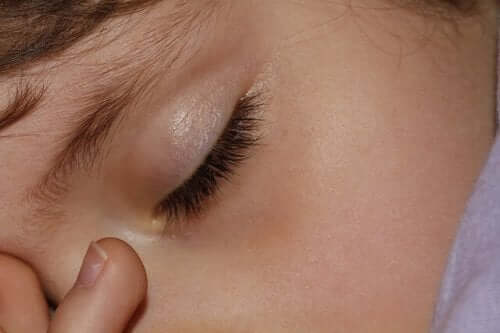4 Things That Interfere with Children's Sleep


Written and verified by the professional writer and specialist in physical education Eva Maria Rodriguez Diego
Between the ages of 6 and 12, children need less sleep than when they’re young, but they still need more sleep than adults. School-age children should get 9-11 hours of sleep every day. However, many factors interfere with children’s sleep and prevent them from getting the rest they need.
Lack of sleep on a regular basis can lead to attention and behavior problems in children, as well as problems with school performance, increased risk of weight gain, and even health problems, as the immune system is also affected by lack of sleep. Below, we’ll look at the most common reasons why children don’t get enough rest.
Going to bed too quickly
It’s not easy for children to fall asleep, even if they’re tired and sleepy. That’s why you have to avoid abrupt transitions for going to sleep. Bedtime routines help children ease into sleep. These routines allow the child to relax and fall asleep sooner.

If you don’t allow your child time to relax before bed, they most likely won’t be able to fall asleep right away. Give your child some time to transition from being awake to being asleep, ensuring that there’s peace and quiet with bath time, brushing teeth, and reading a book.
Lack of routine and inconsistency at bedtime interfere with children’s sleep
Another problem that can interfere with children’s sleep is not going to bed at a certain time each night. To facilitate regular rest and falling asleep quickly, in addition to the pre-bed routines, children need to go to bed at the same time each night.
Children who don’t always go to bed at the same time have more trouble falling asleep and even sleep worse. That is why you have to be firm and respect bedtime on a regular basis to ensure the child’s rest. Keep in mind that, although one day they may stay in bed longer a bit, children will still wake up early, so they’ll also accumulate a lack of sleep.
Consuming foods and drinks that keep them awake
Another cause that can interfere with children’s sleep is caffeine. This substance isn’t only present in the famous cola soft drinks, but also in other substances that are more popular and common among children, such as chocolate. Other hidden sources of caffeine that kids can drink in the afternoon or evening include bottled fruit-flavored teas, energy drinks, sports drinks, energy bars, and even some non-cola sodas.

It’s also not a good idea for them to consume large amounts of refined sugar before sleeping, as this will cause overexcitement that will make it difficult for them to fall asleep. That’s why it’s best to avoid, in addition to chocolates, sweet desserts, products with added sugar, as well as industrial bakery products.
Sleeping near electronic devices
Televisions, mobile phones, tablets, computers, or video games are some of the electronic devices that can interfere with a child’s sleep. Statistics show that even young children are connected to these devices, which not only absorb the child’s attention and distract them, but can also interfere with the balance, quality, and duration of sleep.
To help children sleep longer and better, you need to make sure that there are no electronic devices in their room. If this isn’t possible, you should at least keep them as far away from the child as the room allows and make sure that they’re turned off not only during their sleeping hours but even an hour or two before.
Between the ages of 6 and 12, children need less sleep than when they’re young, but they still need more sleep than adults. School-age children should get 9-11 hours of sleep every day. However, many factors interfere with children’s sleep and prevent them from getting the rest they need.
Lack of sleep on a regular basis can lead to attention and behavior problems in children, as well as problems with school performance, increased risk of weight gain, and even health problems, as the immune system is also affected by lack of sleep. Below, we’ll look at the most common reasons why children don’t get enough rest.
Going to bed too quickly
It’s not easy for children to fall asleep, even if they’re tired and sleepy. That’s why you have to avoid abrupt transitions for going to sleep. Bedtime routines help children ease into sleep. These routines allow the child to relax and fall asleep sooner.

If you don’t allow your child time to relax before bed, they most likely won’t be able to fall asleep right away. Give your child some time to transition from being awake to being asleep, ensuring that there’s peace and quiet with bath time, brushing teeth, and reading a book.
Lack of routine and inconsistency at bedtime interfere with children’s sleep
Another problem that can interfere with children’s sleep is not going to bed at a certain time each night. To facilitate regular rest and falling asleep quickly, in addition to the pre-bed routines, children need to go to bed at the same time each night.
Children who don’t always go to bed at the same time have more trouble falling asleep and even sleep worse. That is why you have to be firm and respect bedtime on a regular basis to ensure the child’s rest. Keep in mind that, although one day they may stay in bed longer a bit, children will still wake up early, so they’ll also accumulate a lack of sleep.
Consuming foods and drinks that keep them awake
Another cause that can interfere with children’s sleep is caffeine. This substance isn’t only present in the famous cola soft drinks, but also in other substances that are more popular and common among children, such as chocolate. Other hidden sources of caffeine that kids can drink in the afternoon or evening include bottled fruit-flavored teas, energy drinks, sports drinks, energy bars, and even some non-cola sodas.

It’s also not a good idea for them to consume large amounts of refined sugar before sleeping, as this will cause overexcitement that will make it difficult for them to fall asleep. That’s why it’s best to avoid, in addition to chocolates, sweet desserts, products with added sugar, as well as industrial bakery products.
Sleeping near electronic devices
Televisions, mobile phones, tablets, computers, or video games are some of the electronic devices that can interfere with a child’s sleep. Statistics show that even young children are connected to these devices, which not only absorb the child’s attention and distract them, but can also interfere with the balance, quality, and duration of sleep.
To help children sleep longer and better, you need to make sure that there are no electronic devices in their room. If this isn’t possible, you should at least keep them as far away from the child as the room allows and make sure that they’re turned off not only during their sleeping hours but even an hour or two before.
This text is provided for informational purposes only and does not replace consultation with a professional. If in doubt, consult your specialist.








